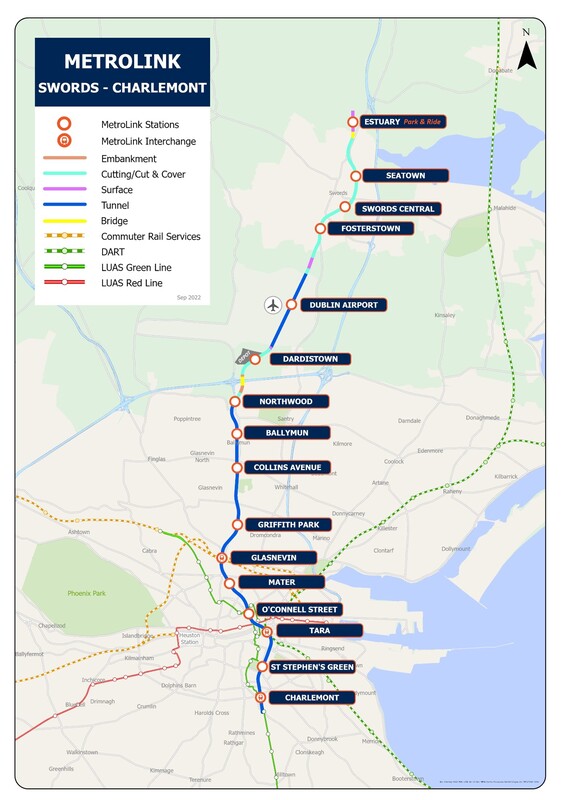|
Record January Monthly Commencement Data Published The Department of Housing, Local Government and Heritage has published its monthly data on the number of Commencement Notices (residential construction starts) for January 2024. The data shows that Commencement Notices for 3,357 new homes were received by Building Control Authorities in January 2024. This is an increase of 59% on the number of new homes commenced in the same month last year (2,108 units) and the highest number of units commenced in January since records began in 2015. The strong uptick in commencements has continued into 2024 with an increase of 6% on December 2023 figure. These figures indicate that supply, which is key to addressing our housing needs continues to increase and that a robust stock of new housing is in the pipeline. Of the 3,357 units commenced, 41% are scheme dwellings, 52% are apartments and 8% are for one-off units. The full commencement data set can be accessed at: Construction Activity Statistics. Dear Minister,
We are writing to advise you of significant developments in relation to MetroLink. You may be aware that An Bord Pleanála (ABP) has decided to hold an oral hearing in relation to Transport Infrastructure Ireland’s (TII) application for a Railway Order for MetroLink (Case Number ABP-314724-22). ABP has recently (8/1/2024) advised us that it has instructed the Senior Planning Inspector, who will prepare a report and recommendation for the Board, to hold an oral hearing into the application and the submissions and observations which have been received in relation to the application. The oral hearing, which is, of course, open to the public will start on Monday, February 19th 2024, at 10.00am and will take place in the Gresham Hotel, O’ Connell Street, Dublin 1. Details of the proposed agenda have now been shared by ABP. See link to agenda. See link to Railway Order. All relevant documentation, drawings etc are available online. MetroLink has been described as a “game-changer” for public transport in 21st Century Ireland. In 2023, TII announced the appointment of an internationally experienced Client Partner team which is responsible for supporting TII in overseeing the delivery of MetroLink. This partnership is made up of Turner & Townsend, Canadian group WSP, supported by O’Connor Sutton Cronin, Mace, and PwC. This wealth of experience, talent and technical resources will make a significant contribution in enabling TII to realise Government’s Policy which is clearly stated in Project Ireland 2040 and included in GDA strategy documents. In anticipation of the approval of a Railway Order, TII, and the Client Partner team have made significant advances in preparation for the procurement of all major contracts that will construct, develop, and operate MetroLink. To prepare for these increased workstreams TII has already advertised for key leadership roles for the MetroLink project. While TII has considerable experience in delivering major transport projects, there is recognition that the scale and complexity of MetroLink will require augmentation of expertise, skillset, and resourcing to successfully deliver a world class automated rail system such as MetroLink. Image: MetroLink Route Alignment Map We appreciate the generous support which we have received from all our public representatives, and we look forward to working with you, particularly in relation to enhancing our relationship with the various communities along the route. Our Stakeholder Co-Ordinators have developed strong local relationships and our initiatives, including the Property Owners Protection Scheme and the engagement of the Independent Expert (RINA) have been very well received by the communities. These initiatives, together with others which will support local community initiatives will continue through the construction phase to the operation phase. We appreciate that all construction projects can be a challenge for local communities, and we really do appreciate the support and encouragement which we have received to date from our local representatives and from the communities, which of course, will derive significant local benefits from a 21st century state of the art public transport system. General Benefits of MetroLink
The Minister for Housing, Local Government and Heritage, Darragh O’Brien TD, today published figures showing 2,481 vacant social homes were brought back into active use in 2023 under the Voids Programme.
Making more efficient use of existing housing stock is a key action of the Government’s Housing for All plan. The Voids Programme supports local authorities in preparing vacant homes for re-letting and builds on the ongoing work to tackle vacancy and dereliction to bring vacant properties into re-use for housing. Minister O’Brien said: "Refurbishment and the return to use of vacant properties helps to reduce pressure on existing housing stock, increase supply, and ultimately, provide much needed homes for people. Apart from addressing the need for social housing, the refurbishment of these unoccupied social homes also has a positive impact on communities. It prevents the decline and abandonment of vacant properties, which, in some instances, can lead to antisocial behaviour I commend local authorities’ for working with us to bring these homes back into active use in 2023. Their efforts, will make a real difference in the lives of over 2,400 households All local authorities are encouraged to continue to be as proactive as possible in the return of all vacant properties to use through the use of the Voids Funding Programme as well as other programmes such as the Buy & Renew and Repair & Lease Schemes. Speed in tackling vacant social housing is also critical to regeneration and improving the vitality and vibrancy of communities in towns and cities across the country. Through this Housing for All action we have now have shifted to a position of planned maintenance of social housing stock to ensure the fastest possible turnaround and re-let times for social housing stock.’’ Of the €46 million recouped to local authorities for the Voids Programme in 2023, €3.4m supported the continuation of payments towards planned maintenance and included funding towards stock condition surveys which help to ensure quicker turnarounds for putting existing stock back into use. Since 2020, the Government has spent over €163 million to return 10,820 homes to active use, this is almost half (46%) of the homes returned over the lifetime of the programme since 2014 (23,315 units). Information on voids data 2014 to 2023 -Consent concludes a detailed planning application process-
The Minister for Housing, Local Government and Heritage and local Fingal TD Darragh O’Brien has granted approval to Fingal County Council for a foreshore licence, foreshore lease and foreshore consent, paving the way for the full development of the Broadmeadow Way. Enabling works are underway at the Broadmeadow Way, a new greenway between Malahide Demesne and Newbridge Demesne via the railway causeway across the Malahide Estuary, and the Ministers consent concludes a detailed application process by Fingal County Council ensuring the shared footpath and cycleway can be developed. Commenting Minister O’Brien said, “This coastal greenway has been a priority for Cllr Eoghan O'Brien, Cllr Ardian Henchy and I for many years. I’m delighted to see it progressing. “Each of us have seen the potential for this project and having recently visited the site and talked through the plans with Fingal County Council I know it will be a magnificent amenity for locals and tourists alike when completed. “Today’s approval is another boost for the project and follows a detailed application by Fingal County Council who must be commended for all their work on this project. “I look forward to the day when I am walking this greenway alongside the families and individuals from our communities,” he concluded. Local Fianna Fáil TD and Minister for Housing, Local Government and Heritage Darragh O'Brien, has welcomed the publication of new data which shows the total number of new homes commencements in 2023.
The data shows that between January and December of last year, 32,801 Commencement Notices for new homes were received by the Building Control Authorities. This is the highest number of annual commencements on record and an increase of 21.7% compared to 2022 (26,957). Minister O'Brien said, "Supply is key to addressing the housing challenges we face. The latest monthly data on commencement notices, showing that a record number of new homes were commenced in 2023, outlines the real progress Fianna Fáil in Government is making in tackling what is the defining issue of this generation. "In December alone, 3,167 Commencement Notices were received, which is an increase of 76% on December 2022. In Fingal, 2,742 homes commenced last year, an increase of over 40% on 2022. "All the key housing indicators - commencements, completions and planning permissions are trending upwards which bodes well for future supply. Fianna Fáil’s top priority remains doing everything we can to help people to afford to buy or rent a home. The figures published today show that our plan is working and my focus is on doing whatever I can to keep this positive momentum going.” |
NEWSArchives
November 2023
|

